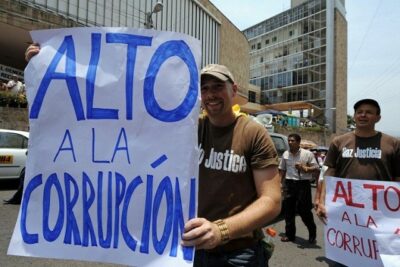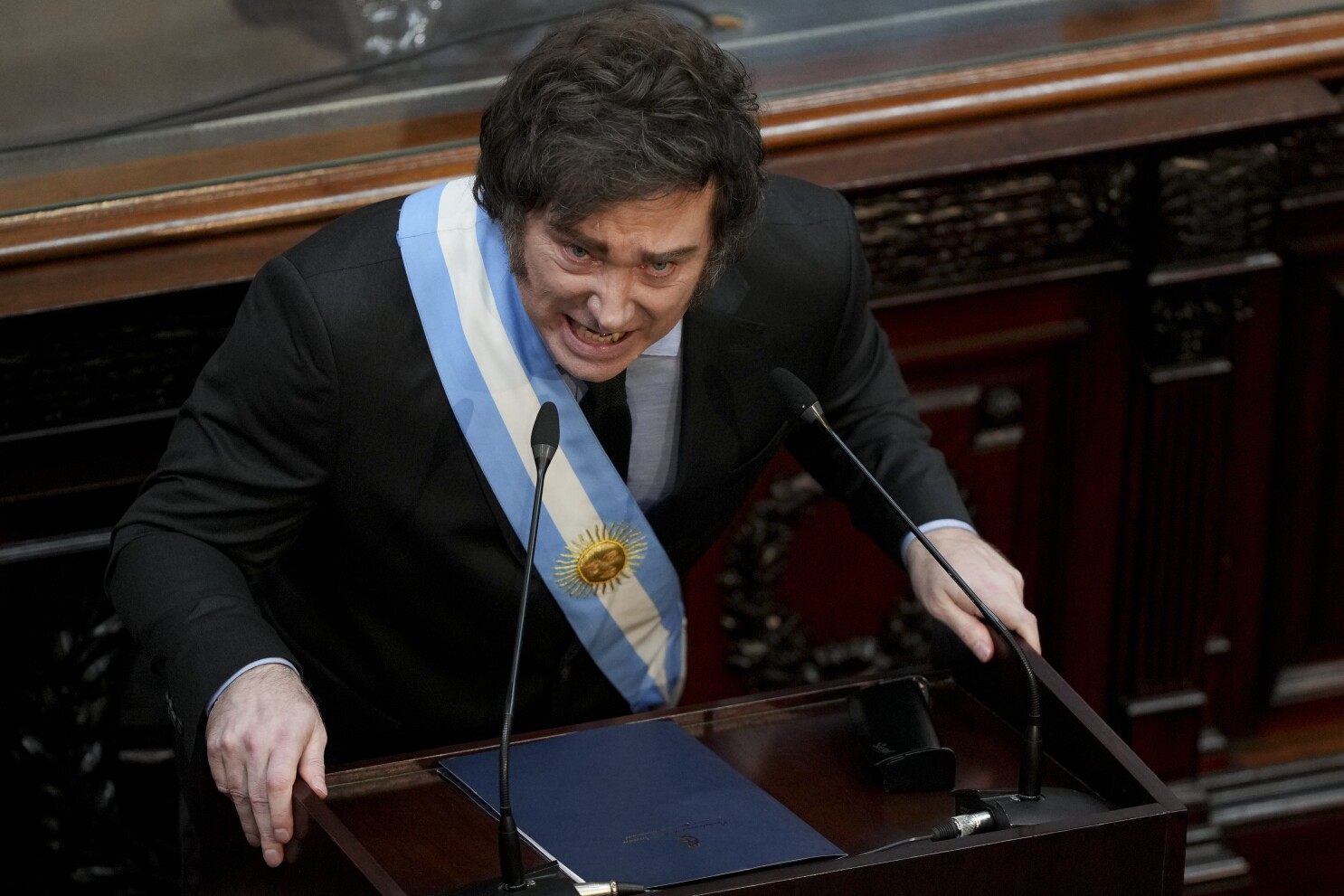 If the United States has struggled in recent years to control the migration of people from Central America, now during President Joe Biden’s administration the battle against migration is even more complex. The biggest rock in the way of the White House’s plans to stop the influx of people across the Southern border is regional corruption and graft.
If the United States has struggled in recent years to control the migration of people from Central America, now during President Joe Biden’s administration the battle against migration is even more complex. The biggest rock in the way of the White House’s plans to stop the influx of people across the Southern border is regional corruption and graft.
In recognition of the impact of this phenomenon, the State Department at the request of Congress last week blacklisted 55 Central American officials and individuals for corruption. Among those singled out are two former presidents, one from Guatemala and one from Honduras; eight high-ranking government officials from El Salvador; congressmen, magistrates, and members of the Supreme Courts of Justice of all three countries.
“There is a real commitment to the people of Central America from the Biden Administration and many of us in U.S. Congress. We need to find ways to support the people, the challenge right now is that many of the governments are going backwards in terms of democracy. What we see in El Salvador is very, very disturbing. Nicaragua and their human rights record is horrible, the arrest of all their political opponents is just unacceptable,” Congressman Jim McGovern said in an interview with La Prensa Gráfica of El Salvador.
Among those named on the corrupt list are former presidents Álvaro Colom of Guatemala and José Pepe Lobo of Honduras. In addition, the Secretary of the Presidency of El Salvador, Carolina Recinos; the private secretary of President Nayib Bukele, Conan Castro; the Minister of Labor of El Salvador, Rolando Castro; active deputies and magistrates of Honduras, Guatemala and El Salvador. As well as former public officials accused in their countries for corruption in recent years.
Amid these tensions, Biden appointed Vice President Kamala Harris as the head of the task force that focuses on plans to contain migration in the region named by the United States as the Northern Triangle. Congress, meanwhile, is seeking to approve cuts in aid to the armed forces and police forces of these countries and the Agency for International Development (USAID) also announced cuts and redirection of funds received by government agencies in the three countries.
“We are rebuilding the programs and funds in these three countries in the interests of combating the roots of migration, which are disrespect for the rule of law, corruption and, of course, insecurity, which at the same time are accompanied by economic conditions. These are the causes of why people continue to leave their countries,” said USAID Director Samantha Power at a press conference in Washington, D.C., after El Salvador’s pro-government deputies dismissed the Supreme Court justices and the attorney general.
In early June, after the government of Daniel Ortega arrested journalists and opponents, the United States announced sanctions against members of the Nicaraguan president’s inner circle, including his daughter. Three weeks later, the U.S. government announced new sanctions for officials from El Salvador, Honduras, and Guatemala, with the publication of the Engel´s list.
According to the State Department, the immediate consequences of these sanctions include the cancellation of visas for the officials and their immediate family members, as well as the prohibition of entry to the United States and the suspension of any other immigration benefit or document that allows them and their immediate family members to remain in the country for study or work purposes. However, for some analysts this list will not generate any negative impact for the government or for those accused of corruption in El Salvador.
“The Salvadoran people gave total power to President Bukele, he enjoys a very high popularity and that was demonstrated on February 28, that people trust in the figure of Nayib Bukele. As much as one wants to explain to the people that it is not correct and that we believed that this was going to change with what happened on May 1, people believe that every decision of the government is of benefit to the people, those of us who know about law, know that it is not so. Five days have passed and not even one official has resigned or been dismissed. They (Bukele’s government) are going to resort to propaganda to make people believe that the United States is the bad guy and that it is the one that wants to prevent Bukele from working for the people,” said Sulem Ayala, a Salvadoran lawyer and political analyst.
In Honduras, the same president who was been singled out by the Department of Justice as the main actor in the drug trafficking case for which his brother was convicted this year in the Brooklyn Court, in New York, said the innocence of the accused must be respected, while a judge determines that they are guilty, and the National Anti-Corruption Council (CNA) issued a document in which it demands the Public Ministry to take action against the accused.
“Of the 21 people in Honduras, 18 are accused of corruption, but the Honduran justice system has acquitted all of them. Other politicians have said that this list reflects how power has been abused in Honduras, by officials and politicians who have held office and have only done so for their own benefit and not for the common good. This shows that in these countries only international justice could do something to stop the advance of the corrupt,” Honduran journalist Xiomara Daniela Orellana told The Americas Program.
Corruption and funding cuts
Warnings of funding cuts in development aid funds from the U.S. government are not new. They gained momentum in December of last year, after the approval of the U.S.-Northern Triangle Relations Improvement Act. Since then, members of Congress, such as Norma Torres, have pointed out that Congress is interested in knowing where the U.S. money has been invested and whether it has ended up in the hands of corrupt politicians.
Torres, of Guatemalan origin, has presented the bills and proposed budget cuts for Central American governments. In addition, he requested a report from the State Department with information on ongoing and concluded investigations of corrupt officials with ties to drug trafficking in the region. Torres is a member of the House Foreign Affairs Committee and the House Budget Committee.
In March, President Joe Biden announced that his Administration would invest more than $4 billion in the three Northern Triangle countries to combat the causes of migration. But he pointed out that this financial aid would not be given to government institutions, but to non-governmental organizations. During her visit to Guatemala, Vice President Kamala Harris reaffirmed that the aid would be given to civil organizations and other private partners that are willing to cooperate and follow the rules of the Biden plans.
The United States knew that the Salvadoran Prosecutor’s Office and the Commission Against Corruption (CICIES) were investigating 12 Bukele government officials for corruption and irregular purchases during the pandemic. Among the amounts investigated were U.S. aid funds. With the dissolution of the CICIES and the appointment of the new prosecutor, Rodolfo Delgado, by pro-government deputies – a man with past links to drug trafficking groups—, these cases are no longer being investigated.
Regarding the list of corrupt officials published by the United States, the Salvadoran prosecutor downplayed the importance of the document and said that the information is not sufficient to investigate cases or indications of corruption in El Salvador because what is a crime for the U.S. Congress is not a crime for El Salvador.
In this regard, the political analyst, Sulem Ayala, believes that El Salvador has regressed in combating corruption in government. But he points out that citizens are the first line of defense against the fight against corruption in each country. However, he also points out that the attitude of the Bukele government and its officials is of concern among experts who follow this issue closely.
“The United States is not in charge of fixing mistakes. Salvadorans are the ones in charge of correcting the course of the country and the problems. Economic distancing is going to happen, and it will be serious, and I am worried that if there is no money, the government is going to resort to loans with China or money from drug trafficking. I am concerned that it is beginning to be seen as normal to open the door to this type of intruders and it is concerning that so many rights are being violated, freedom of the press, freedom of expression… we are seen as a country where corruption begins with the President of the Republic”, said Ayala.



